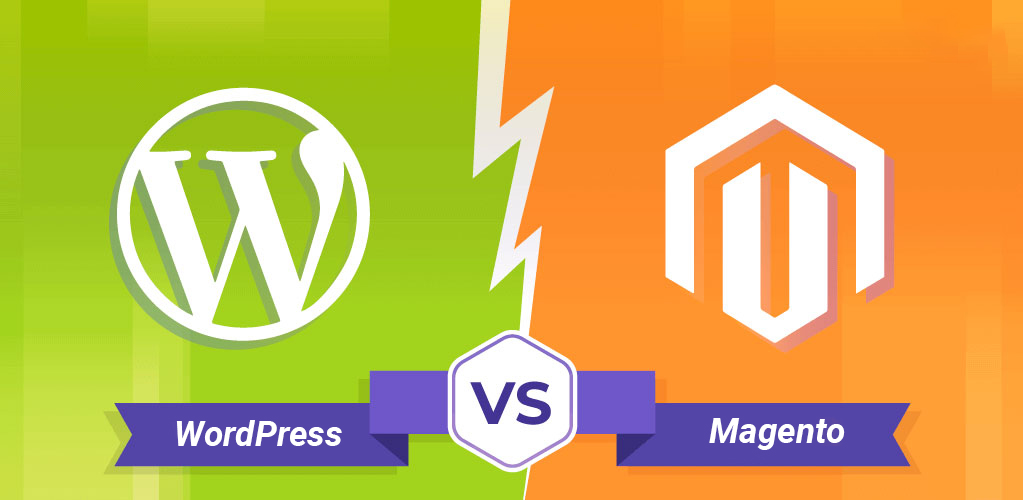You require designing the website for sales and business on e-commerce platforms, you are invited a lot by the parties about services from the company and found that in addition to choosing the appropriate website design companies. With the needs and costs, you also have to choose for yourself the appropriate website building platform to support future development.
If you are wondering about choosing WordPress vs Magento as a website building platform, below, we will compare the two platforms that will hopefully provide more useful information for you.
1. General information about WordPress vs Magento

Magento is an open-source e-commerce platform that allows businesses to create online stores, integrate payment methods, and shipping. In the e-commerce sector, Magento holds a full 26% market share with steady annual growth. The major enterprises in the world that are using this platform are Coca-Cola, Canon, Samsung…. Magento is considered the most powerful e-commerce platform to be flexible in scaling.
WordPress is a platform that is widely familiar with users, is an open-source PHP language supporting personal blogging (like Joomla), the number of WordPress users every year increases exponentially. In the past, WordPress was purely about building and designing news websites, businesses … In recent years, WordPress has been used by many small businesses.
2. Keynotes you need-to-known when choosing an e-commerce platform
If you do not spend a lot of time researching and analyzing you will not be able to know what is the criteria to choose an e-commerce platform. Below, we will list out some of the basic elements for you to grasp when making a decision.
- Purpose: Do you want the platform to go long or short. If the long haul is to choose platforms that are capable of change, flexible scaling can optionally add or remove requirements.
- Cost: How much budget do you have.
- Ease of use: The system is easy for beginners
- API system: Ability to connect with third parties such as Google, Facebook, shipping methods, payment …
- Extensions: This part will depend on the business and development needs of the business in the future
3. The Comparison between WordPress vs Magento
a. Cost
Magento – High cost
The cost of using Magento is quite expensive as the platform offers more value with high-performance cloud storage, extra features. Magento’s core software you can download for free but will at least need a VPS to store the information. In addition to using the extensions you also need to pay for the extensions and this also increases the cost significantly.
WordPress – Low cost
The cost of using WordPress is cheaper than Magento. However, if you want to use WordPress as a sales website, you also need to install additional models and extensions to complete the website. Of course, the cost of WordPress extensions is also quite high and WordPress plugins often fail, so during using the website you will encounter many problems.

b. User-friendly
Choosing the platform for your website must not only meet the needs of your business but also be easy to use. Be it managers, departmental staff … an easy-to-use platform saves time as well as initial training manpower.
Magento – Easy to use
Magento is an e-commerce platform that packs a lot of built-in features in packages. If from the beginning, users will find this system very difficult to use because the workflows are too stacked and linked together. However, after using this platform proficiently, you will be extremely surprised by the scientific arrangement, store management, detailed products to each category, which support a lot in the later process. In addition, Magento has its own website for you to find questions and problems while using the system.
WordPress – Easy to use
It is probably even easier to use than Magento. WordPress has a fairly detailed setup guide including creating pages, installing additional plugins, shipping options, shipping … WordPress is development-oriented for general users, does not have much knowledge. on advanced website programming. The operation is very simple, the intuitive administration interface is very convenient for users.
c. API system
Magento – Open API system
Magento is number one in terms of open API systems. Magento’s API allows developers to easily integrate especially in terms of payment gateways. If the payment gateway you’re looking for isn’t available yet, then you can hire someone to create a custom extension for that, or you can use the links that come with PayPal, Authorize.net, Stripe, 2Checkout, Braintree, WePay, Google Checkout, Skrill and more. It can be said that Magento is very powerful in connecting with third parties, if you are looking for an e-commerce platform that is not below the API limit, Magento is the number one choice.
WordPress – Limited API system
WordPress’ API makes it easy for developers to get into the code and easy to edit options. Compared to Magento, WordPress’ API system is a bit more limited in terms of connectivity with third parties, especially specialized enterprise software.

d. Extensions
Magento – Ready to expand
By choosing Magento as your business platform you won’t have to worry about scaling issues later. Magento’s solid foundation allows businesses to grow from small to large without any problems. In addition, when using this platform, businesses can also optionally add industries and create more websites and stores easily.
WordPress – Limited in scalability
The downside to using the WordPress platform is that your business grows rapidly in terms of both the number of products, the size of the market, or the human resources … the platform cannot meet. And WordPress’ security system is also an issue you should keep in mind.
4. Trend of using Magento instead of other source code
WordPress vs Magento are both full-featured e-commerce platforms that you can use to build your website design for sales. However, if you want to focus on long-term development, you should choose the Magento platform because of its outstanding features in product management, and advanced sales. Above all, Magento also has flexible scalability that allows businesses to grow in the long run. Just remember to migrate all your stores to Magento 2, since Magento 1 is no longer supported.
Of course, depending on the goals of the company’s development stage you can also choose a different platform for the business. Hopefully, this article will help you in the process of choosing and referencing platforms.
Read more: Best eCommerce WordPress Themes to Check Out



